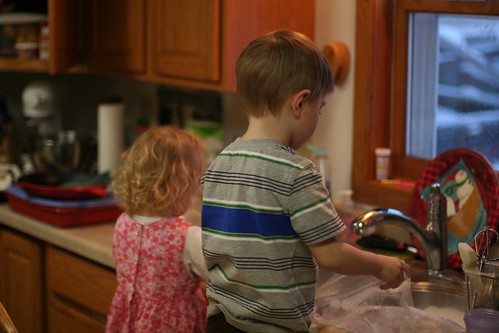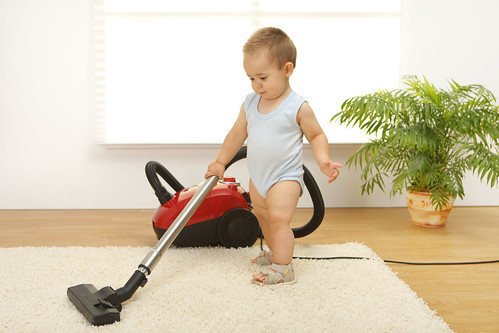Have you been thinking about giving your kids more responsibility? Assigning chores has many positive benefits beyond teaching kids to pick up after themselves. Learn what responsibility is all about and how it can benefit your children with this handy guide.
What Is Responsibility?

Image via Flickr by spi516
Most parents want their kids to grow into “responsible” adults, but that means something a little different to everyone. This broad term brings many different things to mind, such as:
- Being dependable.
- Doing your best.
- Being accountable.
- Acknowledging your mistakes.
- Contributing to the team.
These traits are key to your child’s success at home, at school, and out in the world. Assigning chores is an excellent way to introduce children to the concept of responsibility.
Benefits of Assigning Responsibility

Image via Flickr by evoo73
Assigning age-appropriate chores comes with many benefits, including:
- Improved self-esteem: Kids who regularly do chores have more self-esteem. When they contribute to the family’s success, like helping with the dishes, it feels good. Having a clean kitchen matters to everyone.
- Sense of teamwork: Children who are given tasks to do often feel a sense of belonging and identify with being part of the team. When everyone in the family works together to harvest vegetables from the garden, it’s a much a bonding experience as it is getting things done.
- New life skills: Chores help teach kids life skills. They’re not going to learn how to do the laundry in kindergarten, so those lessons need to happen at home.
- Strong work ethic: Introducing this trait to your children at a young age is invaluable. Teachers and bosses will appreciate your effort, and a strong work ethic may even inspire teens to look for an after-school job.
- Taking care of stuff: Children who are assigned responsibility often learn the value of taking good care of their belongings. They may also become more aware of the messes they make if it’s their job to clean up around the house.
- Ability to follow instructions: Assigning chores is a terrific way to teach kids how to follow instructions. Start with simple tasks, then assign more complex jobs that require several steps.
Tips for Teaching Responsibilities

Image via Flickr by Fort George G. Meade
Below are some helpful tips for parents to use when assigning chores to their kids. The emphasis here is to impart a sense of responsibility, as opposed to expecting perfect performance, so you and your family can reap all the benefits we listed above.
Explain the “Whys”
Age-appropriate explanations go a long way toward cooperation. If you want your child to water the plants, explain what will happen to the plant if it goes without water. Avoid sticking to the “because I said so” model because it’s important for kids to know that their contribution has value, no matter how small or big it is.
Provide Clear Instructions
Take a few minutes to set your kids up for success by explaining each task and teach them how to do it properly. Be specific when delegating the housework. Telling your child to pick up their toys may sound a bit overwhelming. Start simple, with maybe the Lego blocks? Once those are picked up, move on to puzzle pieces, etc. If you want them to sort the laundry, consider using three baskets and label them. Set up one for darks, one for colors, and one for whites.
It’s also essential to help your kids prioritize their to-do list. When writing down what you expect, put the most important tasks first. Be patient if they don’t get it right away, and let them know they did a good job when they get it right. With practice, they’ll become capable little helpers.
Start Early
Start assigning responsibility early. Even children as young as toddlers can help parents put away their toys. Simple tasks like feeding the family pet and dusting can start as young as 4 or 5. As they grow, add more complex jobs based on where they are developmentally.
Completing a more challenging opportunity, such as helping to manage the family’s calendar can also be very rewarding. A sense of accomplishment will help keep them engaged and contributing to the family. This long-term approach is much better than expecting a teenager to suddenly be responsible for a myriad of chores.
Offer a Reward
No one, including adults, enjoys endless hours of labor with no reward. An allowance or special treat can become an excellent motivator for getting things done correctly, but don’t be stingy with praise, either. Vacuuming the living room may earn a hug or movie night, and mowing the lawn could earn them $5 or their favorite dinner.
You decide what works within your budget and be consistent. An allowance also opens up the opportunity to discuss money and how to manage it. Even kindergartners can learn to count money, and it’s never too early to instill an appreciation for saving.
Age Appropriate Responsibilities

Image via Flickr by aqua.mech
Divide and conquer is a terrific method for delegating chores. If your kids have siblings, each child can take care of a few age-appropriate tasks. Here are a few ideas:
Toddlers (ages 2 to 3)
- Help make their bed.
- Pick up toys.
- Help clean up spills.
- Dust.
Preschool (ages 4 and 5)
- Bring their things in from the car.
- Help feed and water pets.
- Clear the table, with supervision.
- Match clean socks.
Kindergarten through Third Grade
- Vacuum.
- Fold Laundry.
- Empty the dishwasher.
- Take out the trash.
Tweens
- Wash dishes or load the dishwasher.
- Clean the bathroom, with supervision.
- Learn to use the laundry machines.
- Do yardwork.
Teens
- Help grocery shop.
- Wash the car.
- Take the trash bin to the street.
- Prepare easy meals.
There’s no reason to feel guilty about assigning your child responsibilities. Whether they’re putting away the groceries or scrubbing the bathroom, kids benefit when they contribute to the household. What chores do your kids do? Do you offer an allowance? Let us know so we can add it to our list of tips.
